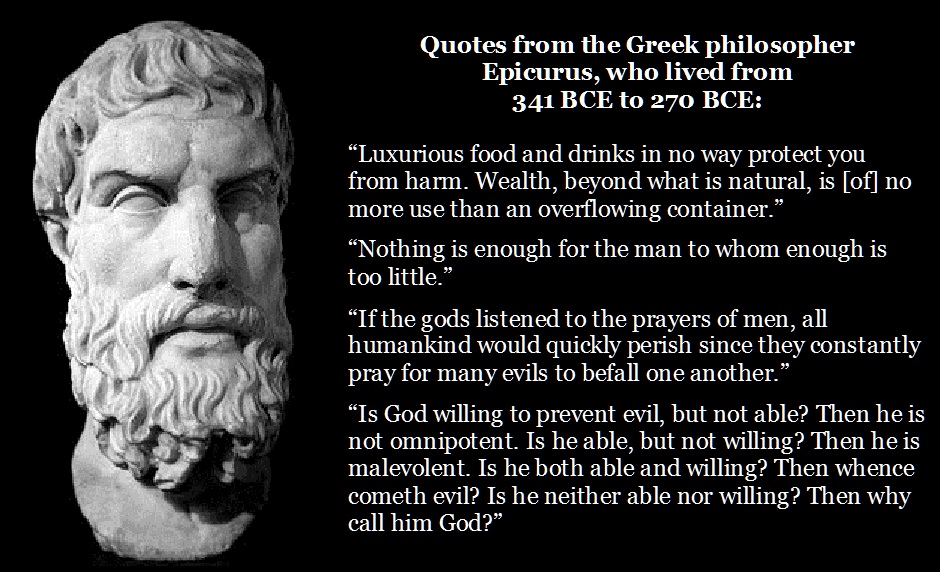Epicurus on god
Table of Contents
Table of Contents
Epicurus, the ancient Greek philosopher, is often quoted as saying “Is God willing to prevent evil, but not able? Then he is not omnipotent. Is he able, but not willing? Then he is malevolent. Is he both able and willing? Then whence cometh evil?”. It’s a powerful quote that has sparked countless debates and discussions about the nature of God and the existence of evil in the world.
Pain Points
Many people struggle with the idea of a loving and all-powerful God allowing evil and suffering to exist in the world. This quote from Epicurus highlights these pain points and forces us to grapple with the idea of a God who is either unable or unwilling to prevent evil.
Answering the Quote
While the quote may seem damning at first glance, it’s important to understand the context in which Epicurus was writing. He was a proponent of the philosophy of hedonism, which taught that pleasure and the absence of pain were the ultimate goals of life. The quote was meant to challenge the commonly held belief that God was both all-powerful and all-loving, and therefore any evil or suffering in the world must be a result of human free will.
Main Points
The Epicurus God Quote challenges us to consider the nature of God and the existence of evil in the world. While it may be difficult to reconcile a loving and all-powerful God with evil and suffering, it’s important to remember that we are not capable of fully understanding the nature of God or the reasons behind the things that happen in the world. Instead of trying to explain away evil, we should focus on ways to alleviate suffering and bring about positive change in the world.
Exploring the Quote
The Epicurus God Quote raises many questions and challenges us to think deeply about the nature of God and our place in the world. Personally, I have struggled with the idea of a loving God allowing evil to exist, and this quote has helped me to delve deeper into my faith and explore the complexities of the world we live in.
At its core, the quote challenges us to question our assumptions about the nature of God and the existence of evil in the world. It forces us to consider whether a loving God could allow evil to exist or whether there is something inherently flawed in our understanding of God’s nature.
Going Deeper
To fully understand the Epicurus God Quote and its implications, it’s important to remember that Epicurus was writing from a specific philosophical perspective. While his ideas about the nature of God and the existence of evil are thought-provoking, they don’t necessarily represent the views of all philosophers or theologians.
The Philosophy of Hedonism
The philosophy of hedonism, which Epicurus espoused, taught that pleasure and the absence of pain were the ultimate goals of life. From this perspective, any suffering or evil in the world would be seen as a hindrance to achieving these goals.
However, other philosophical and theological perspectives, such as those found in Christianity, Judaism, and Islam, offer different interpretations of the nature of God and the meaning of suffering. While the Epicurus God Quote may challenge our assumptions about God and evil, it’s important to remember that there are a wide variety of perspectives on these issues.
Question and Answer
Q: Does the existence of evil mean that God is not all-powerful?
A: The Epicurus God Quote suggests that if evil exists, then God cannot be both omnipotent and loving. However, this assumes a specific definition of God and the nature of the universe. Many theologians and philosophers would argue that God’s ways are beyond our understanding and that evil may serve a greater purpose in the grand scheme of things.
Q: Can we ever fully understand the nature of God?
A: The nature of God is a complex and multifaceted subject that has been explored by theologians and philosophers for centuries. While we may never fully understand the nature of God, we can continue to explore and deepen our understanding through prayer, meditation, and study.
Q: Can we find meaning in suffering?
A: While suffering is often difficult and painful, it can also lead to personal growth and deeper understanding. Many people have found meaning and purpose in their suffering and have used their experiences to help others and bring about positive change in the world.
Q: How can we reconcile the idea of a loving God with the existence of evil?
A: There is no easy answer to this question, as it depends on one’s philosophical and theological perspective. Some argue that God allows evil to exist as a result of human free will, while others believe that evil serves some greater purpose that we cannot fully understand. Ultimately, it’s up to each individual to grapple with these complex issues and come to their own understanding.
Conclusion of Epicurus God Quote
The Epicurus God Quote challenges us to think deeply about the nature of God and the existence of evil in the world. While it may be difficult to reconcile these ideas, it’s important to remember that there are a wide variety of perspectives and interpretations on these issues. By continuing to explore and deepen our understanding, we can find meaning and purpose in the midst of suffering and strive towards a better world.
Gallery
Philosopher Epicurus Quotes. QuotesGram

Photo Credit by: bing.com / quotes epicurus philosopher philosophy god wallpaper philosophical quote evil
Today’s Quotes: Epicurus | Big Fish Ink

Photo Credit by: bing.com / quotes epicurus greek philosophers philosopher philosophy hypocrisy ancient famous his christian quote greece epicurean religion sense common plato reason happiness
Epicurus | Atheist Quotes, Evil Quotes, Atheism Quotes

Photo Credit by: bing.com / epicurus atheist
Epicurus On God - Imgur | Atheist Quotes, Best Atheist Quotes, Atheist

Photo Credit by: bing.com / god epicurus atheist greek quotes atheists who evil able willing but he myths religion openly claimed greece ancient were there
Why Call Him God? -Epicurus - YouTube

Photo Credit by: bing.com / god epicurus him why call





